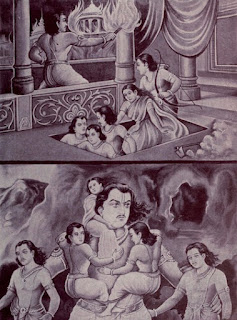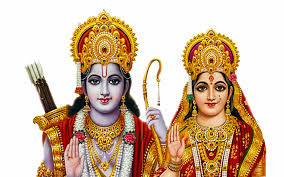Reading Notes: Mahabharata Part B Extra Reading
---I missed the Part B Reading for this week. So, I will use this assignment as my extra credit reading.---
1.The House of Fire
-Prince Duryodhana was plotting against Prince Vidura
-Vidura's mom was a slave
-Could not rule the kingdom
-Prince Yudhishthira and his brothers were in danger
-Prince Duryodhana was trying to kill Yudhishthira
-Vidura came up with a plan to dig a hole in the place for everyone to escape from a fire
-Prince Bhima set fire to the house, killing the guard and Purochana
-The fire accidentally killed a poor woman and her children
This story, so far, has been the most interesting for me. I liked how this section had action and a moral to it as well. Although the fire could have been seen as a good act, they were just being played by evil. Innocent people lost their lives, while everyone thought that Duryodhana survived.
Source. The Indian Heroes by C. A. Kincaid (1921).
2.The Story of Nalayani
- Draupadi has 5 husbands
- Drupada is worried about that
-Vyasa tells the story of Draupadi's previous life
-She was happily married
-Then her husband stops sleeping with her
-She gets lonely
-As a result, she would be able to be satisfied by 5 men
-She was reborn as a high-class woman who can regain her virginity with each man
This story overall taught about the Indian views on marriage and sexuality.
Source. The version of the story below is based on Notes of a Study of the Preliminary Chapters of the Mahabharata by V. Venkatachellam Iyer (1922).
3.The Second Match
-Dhritarashtra is at the palace
-A Jackel was killed
-D was terrified at what happened
-Vidura responded, ""The luckless and sinful Duryodhana hath brought shame upon the head of Rajah Drupada's sweet daughter, and thus courted death and destruction. May the prayers of a sorrowful old man remove the wrath of Heaven which these dark omens have revealed."
This section was interesting because it showed the reader that nothing is ever actually finished.
Source. Indian Myth and Legend by Donald A. Mackenzie (1913).




Comments
Post a Comment